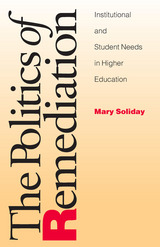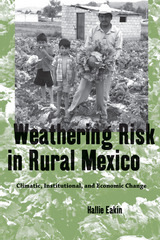
While some students need more writing instruction than others, The Politics of Remediation reveals how that need also pertains to the institutions themselves. Mary Soliday argues that universities may need remedial English to alleviate their own crises in admissions standards, enrollment, mission, and curriculum, and English departments may use remedial programs to mediate their crises in enrollment, electives, and relationships to the liberal arts and professional schools.
Following a brief history of remedial English and the political uses of remediation at CCNY before, during, and after the open admissions policy, Soliday questions the ways in which students’ need for remedial writing instruction has become widely associated with the need to acculturate minorities to the university. In disentangling identity politics from remediation, she challenges a powerful assumption of post-structuralist work: that a politics of language use is equivalent to the politics of access to institutions.

Power-Sharing seeks to explore the unintended consequences of power-sharing for the communities themselves, their individual members, and for others in society. More specifically, it is distinctive in questioning explicitly whether power sharing: perpetuates inter-communal conflict by institutionalising difference at the political level; inhibits conflict resolution by encouraging extremism; stifles internal diversity; and fails to leave sufficient space for individual autonomy.
This book not only provides a theoretical exploration and critique of these questions, but comprehensively examines specific test cases where power-sharing institutions have been established, including in Northern Ireland, Belgium, Bosnia-Herzegovina, Macedonia and Lebanon. It also explores such issues as the role of political leaders, human rights
instruments, the position of women, and the prospects for reconciliation within such societies.
Furthermore it provides a detailed set of policy recommendations to meet the challenges of transition in deeply-divided societies.

In Weathering Risk in Rural Mexico, Hallie Eakin draws on ethnographic data collected in three agricultural communities in rural Mexico to show how economic and climatic change not only are linked in cause and effect at the planetary scale but also interact in unpredictable and complex ways in the context of regional political and trade relationships, national economic and social programs, and the decision-making of institutions, enterprises, and individuals. She shows how the parallel processes of globalization and climatic change result in populations that are “doubly exposed” and thus particularly vulnerable.
Chapters trace the effects of El Niño in central Mexico in the late 1990s alongside some of the principal changes in the country’s agricultural policy. Eakin argues that in order to develop policies that effectively address rural poverty and agricultural development, we need an improved understanding of how households cope simultaneously with various sources of uncertainty and adjust their livelihoods to accommodate evolving environmental, political, and economic realities.
READERS
Browse our collection.
PUBLISHERS
See BiblioVault's publisher services.
STUDENT SERVICES
Files for college accessibility offices.
UChicago Accessibility Resources
home | accessibility | search | about | contact us
BiblioVault ® 2001 - 2024
The University of Chicago Press









